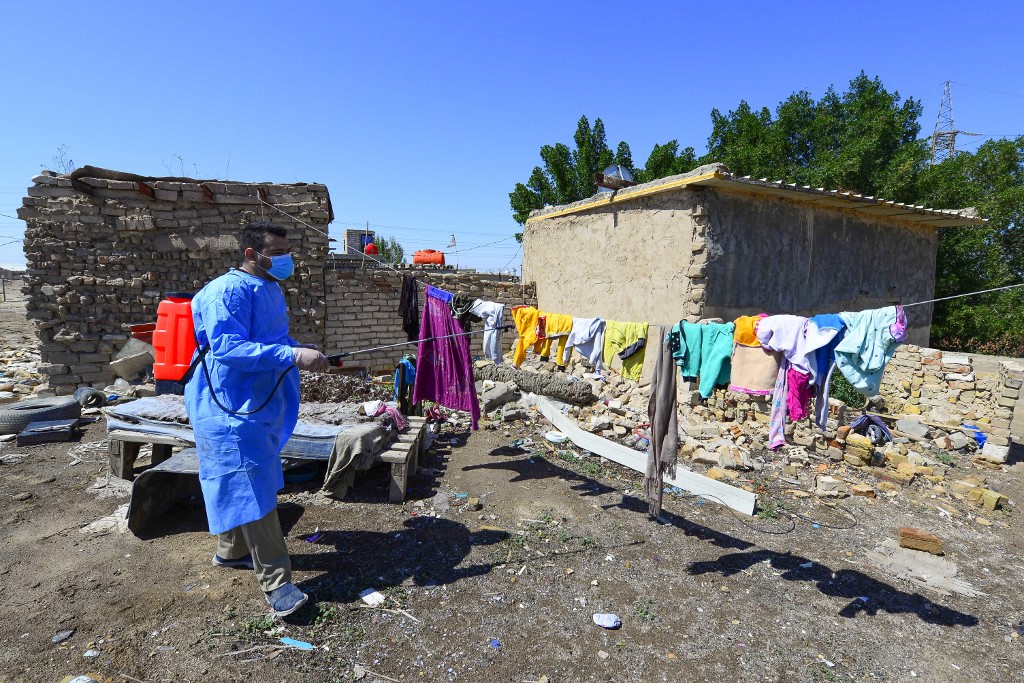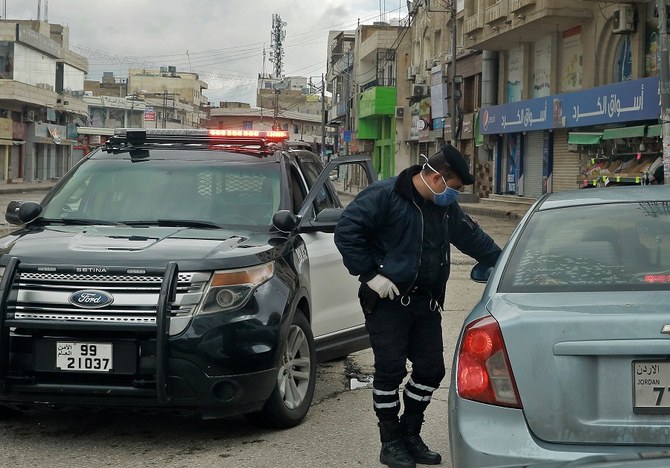DUBAI: As the spread of COVID-19 continues across the globe, some countries in the Middle East imposed further regulations to stop the disease from spreading.
Saudi Arabia imposed an 11-hour curfew for 21 days, from 16:00 until 03:00 (GMT), while Lebanon deployed security forces to ensure residents stay at home.
UAE will close all malls for two weeks in two days, and authorities are urging people to remain at home.
The pandemic has infected more than 336,000 people globally and killed over 14,600. More than 98,300 people have recovered so far, mostly in China.
Monday, March 23 (All times in GMT)
19:54 - Egypt recorded 39 new coronavirus cases and five deaths.
18:50 - Abu Dhabi’s Etihad Airways said on Monday that effective immediately only citizens of the United Arab Emirates or diplomats will be able to board its flights from overseas destinations and only if their final destination is Abu Dhabi, the airline said on twitter.
The UAE is suspending all passenger flights for two weeks from Wednesday to contain the spread of the coronavirus.
Travel Update: Effective immediately, passengers departing from international destinations will only be allowed to travel if they are UAE citizens or diplomatic passport holders, and only if their final destination is Abu Dhabi. (1/3)
— Etihad (@etihad) March 23, 2020
18:45 - Algeria will impose a curfew to combat the coronavirus in the capital Algiers from 7pm-7am and a full lockdown in the town of Blida, center of the worst outbreak in the country, with both measures starting on Tuesday and lasting for 10 days.
The measures, to be enforced by the army, were announced in a statement by the presidency on Monday and residents of Blida will be able to receive food and other staples by delivery, it said.
18:00 - Jordan's King Abdullah II said he has directed the government, armed forces, and security services to deal with this danger with the highest degree of preparedness and formed a crisis cell, urging everyone to abide by the instructions.
17:55 - Europe's footballing body UEFA has postponed the Champions League final, the Europa League final and Women's Champions League final without giving any alternative dates.
17:45 - UN Secretary-General Antonio Guterres called Monday for an immediate cease-fire in conflicts around the world to tackle the coronavirus pandemic. FULL STORY HERE.

17:20 - The death toll from the coronavirus outbreak in Italy has grown by 602 to 6,078, the head of the Civil Protection Agency said on Monday, an 11% increase but the smallest rise in numerical terms since Thursday, suggesting a clear downward trend.
16:42 - Finance ministers and central bank governors from the Group of 20 major economies agreed to develop an action plan in response to the coronavirus and to closely monitor the epidemic’s impact on markets and economic conditions, the Saudi Secretariat said.
A statement released following their virtual meeting said an impromptu virtual summit of G20 leaders initially announced for this week would convene “in a few days” but did not mention a specific date.
16:50 - Sudan announces a curfew across the whole of the country from 8 p.m. to 6 a.m. starting from Tuesday, and Abdel Fattah Al-Burhan, chairman of the Transitional Military Council, said that the country would mobilize all the state and army potential to face the pandemic.
16:40 - The United Arab Emirates decided to return all students studying outside the country, including those on scholarships, within 48 hours, in coordination with educational departments and embassies in the countries they are present in.
16:15 - The curfew in Saudi Arabia has now taken effect to control the spread of #COVID19. The curfew runs from 7pm until 6am every day for 21 days. FULL STORY HERE.
16:15 - The World Health Organization's Tedros Adhanom Ghebreyesus has said the coronavirus pandemic is "accelerating" and that the world's governments need to prioritise healh workers as many lives will be lost if those key workers get sick. WATCH PRESS BRIEFING BELOW:
16:00 - Chancellor Angela Merkel’s spokesman said Monday that the German leader has tested negative for the new coronavirus. Spokesman Steffen Seibert told news agency dpa “the result of today’s test is negative” but that “further tests will be conducted in the coming days.”
15:00 - London's commuters are critical of the UK capital's transport authorities after Monday's rush hour saw packed trains despite the government's advice to avoid public transport and practice social distancing. FULL STORY HERE.

14:53 - President of the General Presidency for the Affairs of the Two Holy Mosques, Sheikh Dr. Abdulrahman Al-Sudais, said the two mosques will keep their main doors open but will close all non-main doors.
The authority said it is working to take all necessary measures and precautions to limit the spread of the coronavirus in cooperation with health and security agencies at the Grand Mosque.
14:20 - Tunisia’s President Kais Saied ordered the army to deploy in the streets to force people to respect a lockdown imposed to halt the spread of coronavirus, the office of the presidency said in a statement sent to Reuters.
Tunisia has 89 confirmed cases of the virus. It imposed a curfew last week and a general lockdown from Sunday that keeps people in their homes except to buy necessities.
13:40 - Confirmed coronavirus infections in Netherlands rise by 545 to 4,749 with 34 new deaths, the Dutch health authorities announced on Monday
13:30 - Britain's Ministry of Defense said on Monday that a team of military planners visited London's Excel Centre - a large exhibition space in the UK capital - to determine how it could help respond to the coronavirus outbreak and assist the country's National Health Service.
12:30 – Saudi Arabia has started preparations for the nationwide curfew that will start at 19:00 Saudi time until the next morning.
The Interior Ministry said violators of the curfew could be imprisoned and fined $2,663.
12:25 – Tunisia has confirmed 14 new cases of coronavirus, raising total to 89.
12:20– Bahrain has suspended prayer in all mosques starting on Monday.
12:15 – The British government has called on its citizens to stay at home to prevent the spread of the virus.
12:15 – The Libyan National Army has announced the implementation of curfew in areas under its control.
11:45 – Morocco has confirmed 134 coronvirus cases in the Kingdom, the Ministry of Health said on its website www.covidmaroc.ma. The ministry also announces the recovery of three patients, while four deaths were reported. READ THE REPORT
11:40 – The Russian Olympic Committee has called for cooperation to come out with a decision on the 2020 Tokyo Olympics.
11:40 – India has suspended all domestic flights as part of the procedures to tackle coronavirus.
11:35 – Iraq has recorded 3 deaths due to coronavirus, 33 new infections bring total cases to 266.

A worker sprays disinfectant over a clothesline near a house in an impoverished neighborhood in Najaf on March 23, 2020. (AFP)
10:55 – A senior Egyptian military official died on Monday from coronavirus, state newspaper Al-Ahram said, a day after state media announced the death of another senior military official.
10:40 – Paris police said it will extend confinement measures in the French capital because of the pandemic.
10:35 – Confirmed cases of coronavirus infections in Spain rose to 33,089, with new death toll of 2,182.
10:00 – Iran reported another 127 coronavirus deaths, bringing its death toll to 1,812 amid 23,049 confirmed cases. Iran is battling the worst outbreak in the Middle East, and has faced widespread criticism for not imposing stricter quarantine measures early on. It is also suffering under severe American sanctions imposed after President Donald Trump withdrew the U.S. from Tehran's 2015 nuclear deal with world powers. READ THE STORY HERE
09:55 – Malaysia reported 212 new coronavirus cases on Monday, the biggest daily jump in the Southeast Asian country and bringing the total to 1,518.
About 970 of the total cases are linked to a religious gathering last month near the Malaysian capital, Kuala Lumpur, the health ministry said.
The death toll from the coronavirus infection rose to 14, the ministry said.
09:30 – Oman records 11 new cases of coronavirus infections, bringing the total number to 66.
09:00 – Tunisia’s public sector told to work from home until April 4, 2020 to protect workers from coronavirus.
08:05 – Kuwait’s Health Ministry recorded one new coronavirus case in the past 24 hours, bringing the total to 189.
A total of 30 people have recovered, and 109 people left quarantine after testing negative.
08:05 – The Philippines has reported 82 new coronavirus infections, raising total number to 462.
07:50 – The number of confirmed coronavirus cases in Germany has risen to 22,672 and 86 people have died from the disease, a tally by public health agency Robert Koch Institute showed on Monday.
07:45 – Hong Kong has banned all non-resident arrivals to the country over coronavirus fears.
07:25 – The Syrian government has announced the first case of the novel coronavirus in the war-torn country, days after starting measures to stem the spread of the pandemic.
Health minister Nizar Yaziji late Sunday said authorities had recorded “a first case of the coronavirus in Syria in a person coming from abroad,” without specifying the country. READ THE STORY HERE.
06:40 – The United Nations will create a fund to support the treatment of coronavirus patients worldwide, Norway’s foreign ministry said.
The purpose of the fund is to assist developing countries with weak health systems in addressing the crisis as well as to tackle the long-term consequences, the ministry added. READ MORE HERE.
06:40 – The United States should lift sanctions if Washington wants to help Iran to contain the coronavirus outbreak, Iranian President Hassan Rouhani said on Monday, adding that Iran had no intention of accepting Washington’s offer of humanitarian assistance.
06:15 – Taiwan government announced 26 new cases of coronavirus, bringing total to 195.
05:31 – With Philippine borders closed to foreigners and tens of millions of people on home quarantine, President Rodrigo Duterte wants the power to control supplies and public utilities, order businesses to help government, and pull funds from state enterprises and departmental budgets to redirect into emergency health needs. READ THE STORY HERE
04:45 – The Philippine health department confirmed 16 new cases of COVID-19, bringing total to 396. The department also reported eight new deaths, raising toll to 33.
04:15 – Cambodia has reported two new coronavirus cases, taking toll to 86.
04:15 – Thailand has confirmed 122 new cases of the new coronavirus, making its total 721.
03:55 – Canada pulled out of the 2020 Tokyo Olympics while Australia said it could not assemble a team due to the coronavirus outbreak, and that its athletes should prepare for the Games to be postponed to 2021. READ THE STORY HERE
01:50 – Moroccan King Mohammad VI has ordered the mobilization of Royal Armed Forces’ medical resources to help the country’s fight against the novel coronavirus. READ THE STORY
Sunday, March 22 (All times in GMT)
23:30 – The UAE announced it will temporarily suspend all passenger and transit flights.
21:45 – UAE is to close all shopping malls as a result of the virus outbreak.
Everyone advised to stay at home except for absolute necessity: UAE government#WamNews https://t.co/c6wD7EfjmP
— WAM English (@WAMNEWS_ENG) March 22, 2020
21:25 – Morocco announced fourth death due to coronavirus. Currently, the total number of cases is at 115.
19:35 – Jordan’s Ministry of Health recorded 13 new cases of coronavirus, bringing the toll to 112.
Authorities have reported one recovery and said all other cases are stable, except an 83-year-old.
18:35 – Sudanese authorities said 31 people have been released from quarantine after testing negative, while 13 cases remain under observation.
















